the traveler's resource guide to festivals & films
a FestivalTravelNetwork.com site
part of Insider Media llc.
Film and the Arts
April '12 Digital Week III
- Details
- Parent Category: Film and the Arts
- Category: Reviews
- Published on Monday, 23 April 2012 10:00
- Written by Kevin Filipski
Host Yul Kwon takes what initially seems a mash-up of themes about America in the 21st century--food, transportation, electricity, manufacturing--and, with the help of stunning aerial and HD photography, makes it compelling, necessary viewing.
The technological advances shown are staggering to see and contemplate; the four episodes’ extraordinary footage from coast to coast looks particularly amazing on Blu-ray. Twenty minutes of bonus footage is composed of a featurette for each episode.
Baseball’s Greatest Games: 2011 World Series Game 6St. Louis Cardinals third baseman David Freese’s dramatic HR in the bottom of the 11th to clinch last fall’s World Series in six games gave the team (and town) its second championship in six seasons.
Anyone who’s even remotely a Cardinals fan will want to pick this up to re-live that immediate classic again and again. Even if you watched the Series on your HDTV, be prepared for more astounding clarity on Blu-ray.
Charlotte Rampling: The LookIn her solid documentary about actress Charlotte Rampling, Angelina Maccarone employs an ingenious structure that avoids her movie becoming a mere career chronology: there are nine sections (with title cards like “Exposure” and “Love”), each with Rampling interacting with artist friends like author Paul Auster and photographer Peter Lindbergh, or her son, director Barnaby Southcombe.
Maccarone also intercuts excerpts from some of Rampling’s many films to further illustrate her themes. The movie comprises mainly interviews and film clips, so the Blu-ray transfer is adequate without being stunning.
The Divide“The earth is ending again, ho-hum”: my thought while watching Xavier Gens’ stylish but repetitive and fatally overlong apocalyptic nightmare.
Armageddon stereotypes are present and accounted for, and Gens relies on shock and mayhem, which fails, as witness the lovely final shots that seem out of another, more philosophically rich movie. But Gens isn’t Andrei Tarkovsky. The hi-def image, especially the darks and blacks, is first-rate; the lone extra is Gens’ and actors’ audio commentary.
Late Spring
 (Criterion)
(Criterion)One of Yasujiro Ozu’s greatest films is this moving but slyly amusing 1949 tale of a widower who decides that his only daughter should marry. Ozu’s masterly restraint, which remains his singular trademark, is complemented by the touchingly effortless performances by his regular stars Chishu Ryu and Setsuko Hara.
The first of Ozu’s timeless classics to arrive on Blu-ray has noticeable wear and tear, but since these were the best elements available, it’s a stunning-looking 63-year-old movie. Extras include NY Film Festival head Richard Pena’s commentary and 90-minute Tokyo-Ga, Wim Wenders' 1985 documentary paean to Ozu.
RoadracersRobert Rodriguez has always made flying-by-the-seat-of-his-pants flicks, and this 1994 made-for-cable road movie is one of his least memorable. It doesn’t help that the blank David Arquette is the leading man, and Salma Hayek--gorgeous, as always--is nearly as wooden.
Even the action scenes and music interludes feel off, making this seem like Rodriguez’s most amateurish effort in a career littered with them. The movie receives a decent but unspectacular hi-def transfer; there’s a Rodriguez commentary and his 10-Minute Film School, both more fun than the movie.
ShameSteve McQueen’s studied, stylized soap opera ruins the serious subject of sex addiction. A successful Wall Street dude jerks off at home and at work, hires hookers, picks up women at bars, and even hooks up for anonymous gay sex! But at least he’s a cultured pervert who enjoys Bach’s Goldberg Variations.
This hysterically unconvincing melodrama even burdens the poor guy with a needy sister who stays at his apartment and walks in on him while he’s masturbating in the bathroom. Shame, indeed! Michael Fassbinder and Carey Mulligan are excellent in a less than hard-hitting character study. A ravishing, dream-like Manhattan still looks that way on Blu-ray; extras are five inconsequential featurettes.
DVDs of the WeekBeing Elmo
Kevin Clash’s life story makes a fascinating documentary, and Constance Marks gets it right with her doc about how a kid from Baltimore who grew up loving puppets ended up rubbing shoulders with Jim Henson and turned the “Red Grover” into the most beloved Muppet.
There’s lots of vintage footage--who was around to record some of these things before Clash became famous?--and interviews that shows that, sometimes, good guys can finish first. Extras include additional footage, interviews and a Sundance Q&A.
Bill Moyers: Capitol CrimesIn the mid-90s, lobbyist extraordinaire Jack Abramoff’s dealings lined his pockets and the coffers of friendly Republicans in Congress with millions in stolen cash. Bill Moyers and his team’s hard-hitting expose shines a light on this sordid story of corruption, showing once again how the Republican party has become synonymous with hypocrisy.
A bonus disc comprises Buying the War, an 83-minute expose of the Bush administration’s case for invading Iraq and the media’s complicity in it, along with interviews with historian Andrew J. Bacevich and Mother Jones magazine’s Kevin Drum and David Corn.
Garbo: The SpyStructured as a real-life thriller, Edmon Roch’s documentary tells the bizarre story of the ingenious double agent whose adventures--including a network of fake agents throughout Europe--fooled the Germans into thinking D-Day would happen on a different day and at a different location.
Cleverly intercutting old spy movie footage with informative new interviews, Roch comes up aces. Extras include a half-hour interview with spy expert Nigel West and 27-minute WWII training film Sonic Deception.
The Getting of WisdomBruce Beresford’s beautifully realized adaptation of the classic Aussie novel by Henry Handel Richardson is among the underrated director’s very best films, a heartfelt yet humorous look at a young woman from the country (the magnificent Susannah Fowle) who refuses to become a proper Victorian lady.
Don McAlpine’s exquisite photography gleams in this new transfer; a wonderful bonus is an hour-long documentary about the making of the film, including interviews with Beresford, Fowle, McAlpine and others.
Paul Goodman Changed My LifeDirector Jonathan Lee re-introduces an important figure in radical political history in this illuminating bio-doc of the unapologetic intellectual who might have been too brilliant for his--or any--time.
Hearing his espousal of ideas that made the likes of William F. Buckley squirm--and watching their priceless exchange on Buckley‘s Firing Line program about American education--is worth the price of admission in itself. Interviews with family, friends and colleagues illuminate a towering figure of the American left. Extras include a Lee interview, deleted scenes and readings of Goodman’s poetry.
Secret WarThe clandestine--and largely successful--war against the Nazis by the British spy agency SOE (Special Operations Executive) is rivetingly recounted in 13 episodes on four discs.
Among many others, there’s the group of heroic Norwegians who risked life and limb to destroy the building that was instrumental in developing an atomic bomb, there’s Hardy Amies, who later became a fashion designer following the war; there’s Polish super-agent Christine Granville, who came to bad end after surviving five dangerous war years; and there’s a French triple agent whose allegiance was continually called into question.
CD of the WeekDebussy/Ravel: Seoul Philharmonic Orchestra
Hearing another recording of this trio of early 20th century masterworks--Debussy’s La Mer and Ravel’s La Mere l’Oye and La Valse--might be a yawn for listeners, since there are plenty of worthy discs out there already.
But these warhorses are also magnificent orchestral showcases, and conductor Myung-Whun Chung leads the Seoul Philharmonic Orchestra in energetic performances. The strings might sound thin at times, but overall the players acquit themselves well enough to wonder why this 54-minute CD doesn’t include another piece that the ensemble could flex its muscles with.
Theater Roundup: "Gore Vidal's The Best Man"; "4000 Miles"; "The Morini Strad"; "Federer vs. Murray"
- Details
- Parent Category: Film and the Arts
- Category: Reviews
- Published on Saturday, 21 April 2012 15:00
- Written by Kevin Filipski
Gore Vidal’s The Best Man
Written by Gore Vidal
Directed by Michael Wilson
Starring James Earl Jones, Angela Lansbury, John Laroquette, Candice Bergen, Michael McKean, Eric McCormack, Kerry Butler
4000 Miles
Written by Amy Herzog
Directed by Daniel Aukin
Starring Gabriel Ebert, Greta Lee, Mary Louise Wilson, Zoe Winters
The Morini Strad
Starring Michael Laurence, Mary Beth Peil, Hanah Stuart
Written by Willy Holtzman
Directed by Casey Childs
Federer vs. Murray
Written and directed by Gerda Stevenson
Starring Gerda Stevenson, Dave Anderson
Back on Broadway, Gore Vidal’s The Best Man—written in 1960 and taking place during an unnamed political party's presidential convention in Philadelphia—remains a pertinent, sophisticated comic drama that concerns Secretary of State William Russell, who initially refuses to smear his opponent, the crackerjack McCarthy-esque senator Joseph Cantwell, in their battle for the nomination, even though Cantwell has info he's threatening to release if Russell doesn’t bow out.
an unnamed political party's presidential convention in Philadelphia—remains a pertinent, sophisticated comic drama that concerns Secretary of State William Russell, who initially refuses to smear his opponent, the crackerjack McCarthy-esque senator Joseph Cantwell, in their battle for the nomination, even though Cantwell has info he's threatening to release if Russell doesn’t bow out.
In director Michael Wilson’s exciting, tautly-paced production, Vidal’s sharp-tongued wit is kept vividly intact by cannily blending overdone histrionics with welcome restraint.
There's satisfying ham in the form of venerable Angela Lansbury as Sue-Ellen Gamadge, head of a women's voting bloc; Kerry Butler as Cantwell’s southern-belle wife Mabel; Jefferson Mays as Sheldon Marcus, Cantwell's former fellow army man whose bombshell revelation might sink Cantwell’s candidacy; and, most spectacularly, James Earl Jones, whose booming, braying basso transforms ex-president Artie Hockstader from homespun folkiness into a memorable orator-in-chief.
More happily restrained are Candice Bergen’s Alice, Russell's plainly elegant estranged wife; Eric McCormack’s smilingly dangerous Cantwell; Michael McKean’s loyal but sardonic Russell campaign manager, Dick Jensen; and, zestiest of all, John Laroquette's eminent and esteemed Russell.
For old-fashioned, intelligent entertainment, The Best Man wins in a landslide.
 The cross-country bicycle trip taken by protagonist Leo in Amy Herzog's comic drama 4000 Miles has nothing on his metaphorical journey of self-discovery while living with ornery grandmother Vera Joseph in her Manhattan apartment.
The cross-country bicycle trip taken by protagonist Leo in Amy Herzog's comic drama 4000 Miles has nothing on his metaphorical journey of self-discovery while living with ornery grandmother Vera Joseph in her Manhattan apartment.
Even though 4000 Miles has laughs and poignancy, the relationship between Leo and Vera never strays far from the level of sentimental soap opera. Of course, these are atypical soap characters: Vera's an unrepentant radical-cum-progressive, and the family's hippie gene has apparently skipped a generation, as grandmother and grandson bond while smoking dope and bemoaning how square his parents/her daughter/son-in-law are.
Lauren Helpern’s set unerringly recreates a typical rent-controlled Manhattan apartment, even down to its corner radiators. Daniel Aukin's unobtrusive direction is helped immensely by his acting quartet. In small roles, Greta Lee acquits herself well as Leo's flaky pickup improbably scared off by his commie grandma, and Zoe Winters imbues Leo’s girlfriend Bec with welcome flashes of life.
As Vera, Mary Louise Wilson's perfectly pitched comic timing deserves better than such a superficial role, while Gabriel Ebert—particularly in the drawn-out monologue in which he describes his best friend's death while they rode through middle America—thrillingly transforms a clichéd hippie into a sweetly misguided y oung man.
oung man.
The Morini Strad is Willy Holtzmann's dry, facile two-hander abou tthe conflict between a hands-on artisan and a prima-donna artist. It's famous violinist Erica Morini—a stubborn talent whose playing was derided as too “masculine” when she was younger—vs. violin maker-restorer Brian; they clash after she hires him to restore her precious (but damaged) Stradivarius violin.
Brian obliges, later discovering she wants to sell it for an outrageous sum before vultures led by—she thinks—her conspiratorial cleaning lady swoop in to pluck the priceless instrument from her hands.
Holtzman's standard-issue premise—Brian lives a normal suburban life with his wife, sons and barking dog, while Erica's in a Fifth Avenue doorman apartment with all the arrogance of a celebrity always catered to—keeps his drama on an unsurprising path. There are humorous exchanges, but even more eye-rolling comic lines, as when Erica mentions fellatio, calls John Lennon “Lenin,” or prefers the Rolling Stones because “Michael Jagger” once came backstage.
Mary Beth Peil growls endearingly as Erica, Michael Laurence makes a believably scruffy Brian, and exemplary violinist Hanah Stuart performs Tchaikovsky and Part as a young Erica. Casey Childs has smoothly directed a play that will resonate more with artists or artisans in the audience than the general public.
 Gerda Stevenson's Federer vs. Murray packs a lot into 55 minutes. The world-class tennis players of its title never appear, but their important Wimbledon match conveniently parallels the grudge match between a husband and wife, whose own sorrowful tragedy is played out on the bitterly contested battleground of their living room.
Gerda Stevenson's Federer vs. Murray packs a lot into 55 minutes. The world-class tennis players of its title never appear, but their important Wimbledon match conveniently parallels the grudge match between a husband and wife, whose own sorrowful tragedy is played out on the bitterly contested battleground of their living room.
Flo (played with steely rage by the author, who also directs succinctly) works overtime at a local hospital and cannot bear to think—let alone talk—about her son, a soldier killed in Afghanistan. Her laid-off husband Jimmy (a superbly controlled Dave Anderson) wants life to go on despite their beloved son’s death: they and (unseen) daughter Mary are alive, and—huge fan of the professional and gentlemanly Federer that he is—he wants to travel to his hero’s native Switzerland and see the Matterhorn in all its snowy glory.
Yes, there are metaphors tripping over metaphors, some clunkily, others snugly: when the couple gets painted faces in their heroes' flag colors, things become amusing if obvious; when a saxophonist (the talented Ben Bryden) appears during interludes to play melancholy music, we see him as their son, whose instrument Jimmy pulls out to toot. In case we miss the connection, Bryden enters at the end wearing fatigues.
She might wield a sledgehammer instead of a racket, but Stevenson has created a powerful portrait of people being pulled apart by grief while trying to keep a tenuous hold on their tattered relationship.
Gore Vidal’s The Best Man
Previews began March 6, 2012; opened April 1; closes July 8
Schoenfeld Theatre, 236 West 45th Street, New York, NY
http://thebestmanonbroadway.com
4000 Miles
Previews began March 15, 2012; opened April 2; closes June 17
Mitzi Newhouse Theater, 150 West 65th Street, New York, NY
http://lct.org
The Morini Strad
Previews began March 20, 2012; opened April 3; closes April 28
59 E 59 Theatre, 59 East 59th Street, New York, NY
http://primarystages.org
Federer vs. Murray
Previews began April 4, 2012; opened April 10; closes April 22
59 E 59 Theatre, 59 East 59th Street, New York, NY
http://59e59.org
April '12 Digital Week II
- Details
- Parent Category: Film and the Arts
- Category: Reviews
- Published on Saturday, 14 April 2012 10:00
- Written by Kevin Filipski
Blu-rays of the Week
(Raro)
Luchino Visconti--the Italian director whose best films (Bellissima, La Terra Trema) were smaller-scaled than his more celebrated, but less good, operatic ones (Rocco and His Brothers, Death in Venice, The Damned)--made this 1974 chamber drama, his penultimate film. In this clash between a strident Italian family and a retired American professor living in Rome, Burt Lancasterlooks lost throughout, and the relationships are strictly soap-opera.
The movie’s intimacy is served well on Blu-ray, with pleasingly muted colors. There’s an option to watch in English (with Lancaster’s real voice) or dubbed in Italian. The lone extra is an interview with critic Alessandro Bencivenni.
The Darkest Ho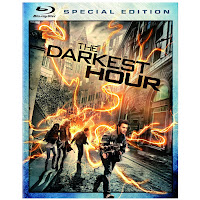 ur
ur
(Summit)
Director Chris Gorak’s alien invasion thriller interests if only due to its insane premise and superb locations. The lethal invaders can vaporize any living being quickly, so the only hope is to get behind glass (because the monsters can’t see through it). Moscow is a wonderfully photogenic city, and Gorak makes the most of it, using the Kremlin, St. Basil’s Cathedral and the massive Gum department store as backdrops for the grisly goings-on.
The splendid effects and settings look spectacular on Blu-ray; extras include a new short, Survivors, making-of featurette, deleted/extended scenes and commentary.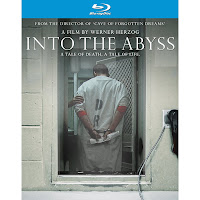
Into the Abyss
(MPI/Sundance Selects)
Werner Herzog’s evenhanded, relentlessly probing documentary about prisoners on death row isn’t a cut-and-dried anti-capital punishment screed; instead, Herzog--as always in his non-fiction films--digs deeply by bringing in everyone affected by a triple murder in Texas: the killers and their families, the victims’ families, even a priest and executioner who have attended many state-sanctioned killings.
Since the movie is mainly interviews (Herzog’s inimitable voice asks the gently probing questions), the hi-def transfer is adequate, nothing more. No extras, but four episodes of On Death Row (a program on the Investigation Discovery network) are brilliant pendants to this full-length exploration.
The Iron La dy
dy
(Weinstein/Anchor Bay)
Meryl Streep’s tour de force (and Oscar-winning) portrayal of Margaret Thatcher dominates Phyllida Lloyd’s Cliff Notes summary of the former British prime minister as the most polarizing politician of her time. Lloyd and screenwriter Ari Morgan fumble the strands of their protagonist’s controversial life, but their star brings them to forceful, purposeful life.
Streep even overcomes the urge to engage in her usual self-indulgences: the harrowing close-ups of an elderly Thatcher--beaten down, tired and lonely--are unusually intimate, rather than a way for the actress to show off her formidable technique. The Blu-ray image is as flawless as Streep; extras include on-set featurettes.
A Streetcar Named Desire 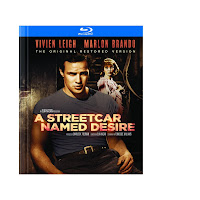
(Warners)
Marlon Brando's incendiary Stanley Kowalski is best remembered in Elia Kazan's blistering adaptation of Tennessee Williams' play, but he's really just one-quarter of a sublime ensemble: Karl Malden is a terrific Mitch, Kim Hunter an enchanting Stella and Oscar winner Vivien Leigh a sad and sympathetic Blanche DuBois.
Despite censorship constraints, Williams' classic stage work retains its power, abetted by stunning B&W photography and Alex North's jazz-inflected score. On Blu-ray, the scrubbed-clean film loses none of its clarity and power; extras include featurettes on Brando, Kazan, Williams and North, and a commentary featuring Malden and two film historians.
DVDs of the W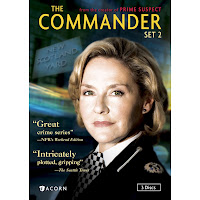 eek
eek
The Commander, Series 2
(Acorn Media)
Hoping that lightning would strike again, Prime Suspect creator Lynda LaPlante created another strong female detective, but—on the evidence of the four 90-minute mysteries in this set—misses this time.
Amanda Burton is a persuasive Clare Blake, whose willingness to try unusual methods to crack cases is controversial, and there’s a crack supporting cast, but these people and their investigations rarely engage on an emotional level, a far cry from LaPlante’s earlier hit, when Helen Mirren shook things up as Jane Tennyson.
King of Devil’s Island 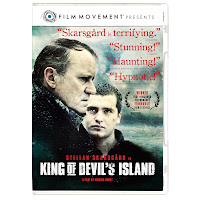
(Film Movement)
Stellan Skarsgard’s typically intense portrayal as the cruel head of a Norwegian reform school dominates director Marius Holst’s dramatic reenactment of a true story about a group of young men who are pushed to the brink of rebellion by a series of horrible mistreatments.
Holst’s film builds to an emotionally stirring climax, and its excellent young actors--mostly amateurs, but all unfamiliar to these eyes--heighten its authenticity. Holst’s eye is unerringly true throughout; the lone extra is Al Mackay’s short, Bale.
Logan’s Run: The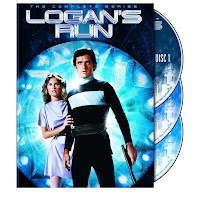 Complete Series
Complete Series
(Warners)
The 1976 futuristic movie with Michael York and Jenny Agutter is now a cult item, but the 1977 TV series it spawned was a bomb: only 11 episodes ever aired. But with this DVD release, all 14 episodes—the final three have never before been seen--can be reappraised by discriminating (or even undiscriminating) fans.
Gregory Harrison broods handsomely, Heather Menzies is his adorable sidekick and Donald Moffat appropriately bemused as the smarter-than-everyone android. The laughably miniscule special effects budget is a big reason why the show approaches campiness. But is that its intention?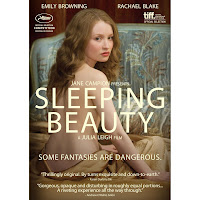
Sleeping Beauty
(IFC)
Emily Browning is a nubile actress: that’s the take-away from Julia Leigh's plodding, pretentious and unsexy character study about an intelligent young woman who works for an agency where she sleeps naked in bed as brutish men paw her, slap her around, even burning her with a cigarette.
The movie is ravishing to look at (like its star), but this knock-off of Eyes Wide Shut’s orgy sequences is so misconceived that viewers may wish they were asleep like the leading lady, blissfully unaware of what’s happening.
CD of the Week
Martin, Honegger, Schoeck: Cello Concertos
(BIS)
Although the three enticing concertos by Swiss masters Frank Martin, Arthur Honegger and Othmar Schoeck are too infrequently heard to make lists of the best 20th century concertos, this disc’s performances by Swiss soloist Christian Poltera and the Malmo Symphony Orchestra under the subtle direction of conductor Tuomas Hannikainen may, one hopes, change minds.
The combination of Martin’s supremely melodic and dramatic work, Honegger’s elegant, concise style and Schoeck’s huge emotional range is a joy to hear on an intelligently-programmed disc that deserves many repeat playings.
Theater Roundup: "Newsies from Screen to Stage; Simon's "Lost" Found
- Details
- Parent Category: Film and the Arts
- Category: Reviews
- Published on Thursday, 12 April 2012 10:00
- Written by Kevin Filipski
Newsies
Music by Alan Menken; lyrics by Jack Feldman; book by Harvey Fierstein
Directed by Jeff Calhoun; choreographed by Christopher Gattelli
Starring Alec Beard, Dominic Comperatore, Stephanie Cozart, Matthew Gumley, Cynthia Harris, Russell Posner, Finnerty Steeves
Written by Neil Simon; directed by Jenn Thompson
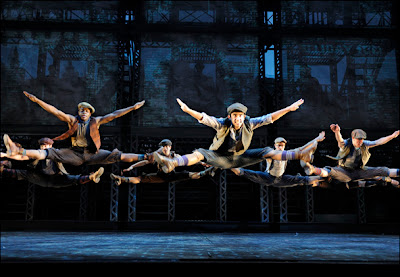 The cast of Newsies (photo by Deen van Meer)
The cast of Newsies (photo by Deen van Meer)
Disney’s latest Broadway endeavor is Newsies, based on Kenny Ortega’s 1992 movie musical about an 1899 newsboys’ strike in New York City that pitted poor, young newspaper sellers against publishing titans like Joseph Pulitzer, who raised prices under the assumption that the kids would simply capitulate. Needless to say, they don’t.
The entertaining movie, which flopped 20 years ago, features Christian Bale years before he hit stardom as Batman--but no one wanted to see an old-fashioned Hollywood musical about paperboys on strike. The Broadway show has the same hurdles to clear, but between Disney’s PR machinery and family-friendly subject matter, it will surely perform better onstage than onscreen.
Actually, this Newsies is pretty much irresistible, starting with Jeremy Jordan as Jack Kelly, the leader of the striking--and ultimately triumphant--“boys” (most of the actors are much older than their characters, of course). Jordan (who was a racy Clyde Barrow in the recent flop musical, Bonnie and Clyde, on Broadway) has star quality in his veins, leading-man good looks and a strong singing voice. The rest of the “kids” are mostly indistinguishable, excepting little Lewis Grosso as an adorable Les, younger brother of reluctant new newsie Davey.
The major difference between movie and musical is Jack’s love interest. In the movie, she’s Davey and Les’s sister, who never appears in the show; instead, a convoluted subplot introduces Katherine (sweet-voiced Kara Lindsay), a budding reporter who turns out to be--oh, the humanity!--bad guy Pulitzer’s daughter.
The songs by composer Alan Menken and lyricst Jack Feldman (most originally from the movie) are serviceable, Christopher Gattelli’s choreography--especially in the rousing dances for the newsies--is spectacular, and Jeff Calhoun’s savvy direction makes the most of Tobin Ost’s clever erector-set design, which constantly moves to and fro to keep visual interest whenever the otherwise delightful family show marks time.
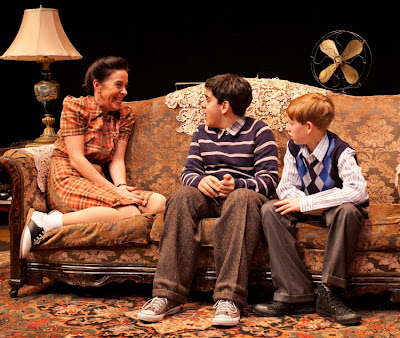 Steeves, Gumley and Posner in Lost in Yonkers (photo by Stephen Kunken)
Steeves, Gumley and Posner in Lost in Yonkers (photo by Stephen Kunken)
Off-Broadway, Neil Simon’s 1991 Pulitzer and Tony winner, Lost in Yonkers, is being wonderfully revived by the enterprising theater company TACT, and whatever’s lost in the transition from the Broadway stage to TACT’s tiny space is compensated for by an intimacy heretofore unseen in Simon’s most autobiographical work.
On the heels of his acclaimed ‘80s trilogy--comprising Brighton Beach Memoirs, Biloxi Blues and Broadway Bound--Lost in Yonkers is Simon’s most fully rounded and satisfying play. It’s hard to fathom that, a mere two decades ago, Simon was a box-office sensation, and today he’s remembered for his superficial comedies with one-liners strewn throughout, like Barefoot in the Park and The Odd Couple.
The usual one-liners also make their way to Yonkers, as 15-year-old Jay and 13-year-old Artie--who in 1942 are made to live with their stern Grandma Kurnitz when dad Eddie must leave town to find work to pay off a loan shark--muster enough zingers for a top comic’s stand-up routine. Yet such verbal virtuosity is the boys’ defense mechanism to steel themselves against the adults in their lives: in addition their father and grandmother, there’s flighty Aunt Bella and crooked Uncle Louie.
Simon’s sentimental and schematic play is essentially Death of a Salesman with jokes, but his flawed characters are warmer and more plausibly human than Arthur Miller’s. In Jenn Thompson’s beautifully paced staging, it’s well worth spending two-plus hours with this family, brought to life by a cast which flawlessly combines sitcom jokiness and touching vulnerability.
The boys, Matthew Gumley (Jay) and Russell Posner (Arty), are pitch-perfect. Even more impressive while stepping into the formidable (and Tony-winning) shoes of Mercedes Ruehl and Irene Worth, respectively, are Finnerty Steeves (Bella) and Cynthia Harris (Grandma), who triumph by avoiding the strong pull of caricature. Getting Lost in Yonkers is time well-spent.
More Articles...
Newsletter Sign Up




















